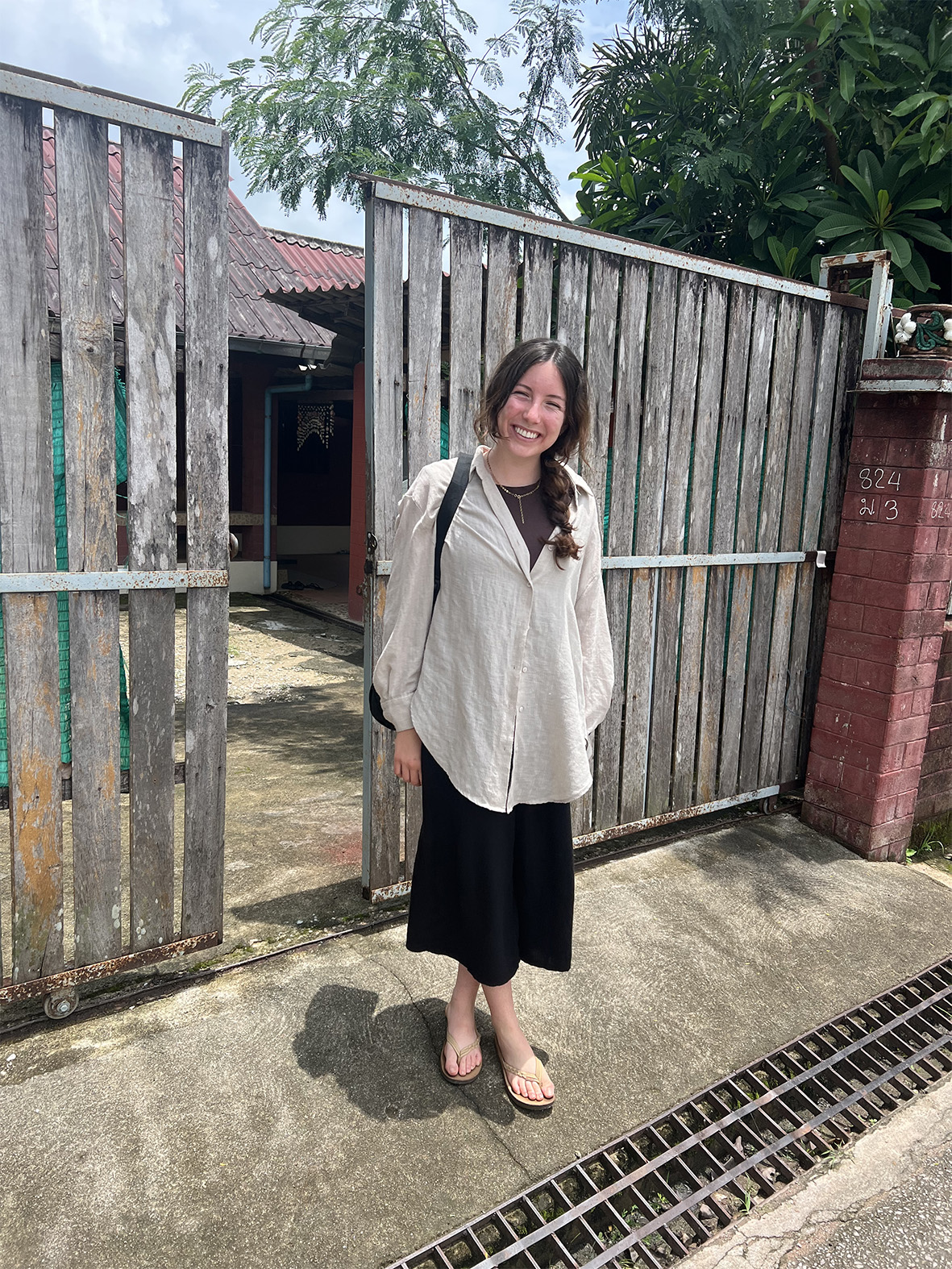Philosopher Emmanuel Levinas wrote, “The very relationship with the Other is the relationship with the future.”
Over this past summer, my thoughts frequently returned to Levinas and his philosophy of the “Other.” The Other is the fundamentally unique individual who is different from oneself. When the Other is encountered, one experiences an ethical call, a responsibility, to respond to their vulnerability and alterity. While we are all “Others” to one another, I’ve never experienced this ethical call so profoundly as I did this summer.
Meetings in Thailand
I first had the privilege of traveling to Thailand with Oddny. On one particular occasion, we met with a Burmese woman who had left her home for a safer, better life. She was the sole provider for her family. In addition to paying expenses for her husband and two kids, she used the remainder of her small income to support her extended family and fund the education of young girls from Myanmar. Despite coming from unimaginable hardship, this is a woman who became a source of hope in a world that had given her every reason to turn inward.
A second group with whom we met was amongst those who protested the 2021 military coup. As doctors, lawyers, and government administrators, they chose to stand against injustice, knowing the risks. These were men and women with job security and a high income. They chose to protest—a sacrifice they made on principle—and are now actively hunted by their government. In addition, they carry the weight of the trauma: the sound of gunfire as their fellow protesters were shot, and the haunting images of them falling. These are brilliant individuals who chose, even in the face of danger, to do what is right and just.
Ukraine
The second part of my travels took me to Ukraine to volunteer at the Novi-sponsored summer youth camp. There, I met kids who are victims of a war they didn’t choose. While at camp, my team and I led an “English club.” It was located close to the camp zipline. The kids were divided into groups, and the first time a group went across the zipline while another was at an English club, the kids flinched in visible fear at the sound of the zipline – to them it closely resembled the sound of airfire and buzzing drones. Wow. I never heard that when I rode a zipline as a kid. These kids, whose homes are all in territories experiencing intense Russian bombing, are carrying burdens far beyond their years.
After each of those experiences, I still find myself speechless at the unfathomable generosity, bravery, and courage. From the Karen of Burma to the children of Ukraine, I could not possibly understand their suffering. However, I could not look away from it either—I felt a deep, unshakable responsibility to bear witness, to listen, and to act in response to their courage, pain, and enduring humanity.
I’ve since returned home, and the question I keep asking is what now? I cannot return to the life I once lived because I am not the person I once was. If I choose to ignore the Other that beckons for help, then I do so cognizantly. The question thus becomes—how? How can I help? What can I do?

Hope is not a luxury
For me, I found part of the answer to this question through the many encounters with these people. I began to understand that hope is not a luxury for them—it is a form of survival. When the alternative is despair, hope becomes the strength to endure, to speak out, and to keep going despite overwhelming hardship. When there are governments, systems, and structures that seemingly render a person or peoples powerless, hope is the individual choice, the weapon, that declares otherwise. This goes without saying: If they have chosen to hope—to act—in the face of oppression, pain, and suffering, then so am I.
That said, the relationship with the Other is our relationship with the future.
One of the most beautiful aspects of Emmanuel Levinas’ philosophy is the notion that we do not understand the Other. If we did, they would no longer be other. A future of peace is thus not dependent on simply understanding one another. Rather, the future is dependent on our relationships with one another.
I feel powerless to alleviate their pain and suffering. I cannot change the government that persecutes its own people, or broker peace between warring nations, but I can choose to stand in solidarity with the brave Karen people and resilient Ukrainian children.
Learning to paint
In many ways I am a painter whose canvas is blank. I do not know whether to choose red, yellow, or blue; oil pastels or acrylic; abstract or realistic. I do not know what I shall paint … or even how to paint … yet I am compelled to try to illustrate that the future is our choice and our design. Relationships are a choice we get to make. They are our most powerful means of choosing a different future, of writing a global story of peace, justice, and dignity. We choose how we treat one another.
I end with this…to Steve and Oddny…thank you for believing that, at 19, I can begin to make these choices. Thank you for showing me your canvas, so that I, too, may learn to paint. Your unwavering commitment to what is good, loving, and just continues to empower and inspire me—and so many Others. As you have done, I will keep telling their stories, honoring their voices, and carrying the memories we made together, one brushstroke at a time.
Madi Kerrigan is currently studying political science in San Diego. She worked as an intern with Novi last summer.